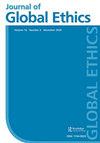Towards an ethics of compassionate care in accompanying human suffering: dialogic relationships and feminist activist scholarship with asylum-seeking mothers
Q2 Arts and Humanities
引用次数: 0
Abstract
ABSTRACT In the face of forced migrants’ urgent needs and ongoing human rights violations endured within and across borders, scholars note the ‘dual imperative’ (Jacobsen and Landau 2003) of documenting these realities while also responding through humanitarian advocacy and/or political activism. This article documents one such experience, that is, an action research process that began with the first author’s accompaniment of Central American asylum-seeking mothers and children in Boston and included witnessing to and documenting these mothers’ narratives in a context of systemic injustice, while contributing to the creation of a humanitarian grassroots network. The latter supported migrants’ needs while advocating for their right to asylum. Reflecting on these experiences, we explore how research that creates knowledge while acting in the world, demands what we herein describe as feminist activist scholarship grounded in dialogic relationality and compassionate care. The latter moves beyond empathetically feeling for or documenting the suffering of others, towards mutual accompaniment to engage in concrete actions to alleviate that suffering. The dialogic relationships of care in which scholars accompany and act with those at the margins have the potential to transform conventional, post-positivist knowledge production strategies from distancing or objectifying processes towards mutual accompaniment and activist scholarship.走向伴随人类苦难的同情关怀伦理:与寻求庇护的母亲的对话关系和女权主义活动家学术
摘要面对被迫移民的迫切需求和在境内外持续发生的侵犯人权行为,学者们注意到记录这些现实的“双重必要性”(Jacobsen和Landau,2003年),同时通过人道主义宣传和/或政治激进主义做出回应。这篇文章记录了一个这样的经历,即一个行动研究过程,该过程始于第一作者在波士顿陪同中美洲寻求庇护的母亲和儿童,包括在系统性不公正的背景下见证和记录这些母亲的叙述,同时为建立人道主义基层网络做出贡献。后者支持移民的需要,同时倡导他们的庇护权。反思这些经历,我们探索了在世界上行动的同时创造知识的研究如何要求我们在这里所说的基于对话关系和同情关怀的女权主义活动家奖学金。后者超越了对他人痛苦的同情或记录,而是相互陪伴,采取具体行动来减轻痛苦。学者们陪伴边缘人群并与边缘人群一起行动的对话式关怀关系,有可能将传统的后实证主义知识生产策略从疏远或物化过程转变为相互陪伴和积极的学术。
本文章由计算机程序翻译,如有差异,请以英文原文为准。
求助全文
约1分钟内获得全文
求助全文

 求助内容:
求助内容: 应助结果提醒方式:
应助结果提醒方式:


